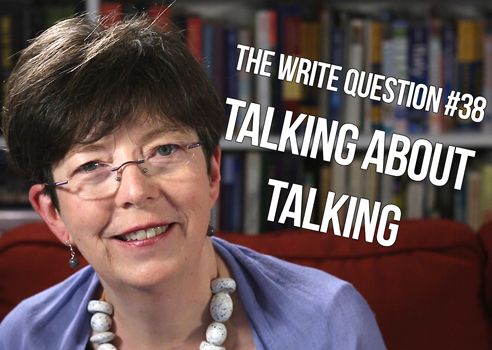The Write Question is a weekly video podcast about writing that I started in 2017 and that ran, more or less weekly, until April 2022. This is a republication of issue #38, about whether talking about writing is a good idea. The post first ran on Nov. 24/17.
Transcript:
Welcome to The Write Question. I’m Daphne Gray-Grant. Today we’re talking about talking….
Today I’m answering a question from Susan Soriano from Hastings-on-Hudson, New York. Here’s her question.
[recording] When do you think it’s safe to talk about your writing or your writing project to non-writers?
Thanks for your question, Susan. I’m a much quieter and more reserved person than I was 30 years ago so I now have less of an urge to talk about what I’m writing.
But if you’re more socially inclined than I, or if writing is new and exciting to you, then I can see why you might be tempted to want to share your thoughts with others. Anything with the sort of deadline that a book carries — usually at least a year — is going to be even more tempting to speak about.
But I suggest avoiding that. Here’s why.
If you’re able to talk through your material with others, your desire to do the hard work of WRITING it will probably decline.
Talking is easier than writing. Have you ever looked at a transcript of a conversation? It’s filled with Umms and Ahs and You Knows. And sentences tail off all the time. The expectations of writing are not the same as talking. Organization and fine language are not expected when we speak.
Sometimes we talk with our hands, which you can’t do in print. And we constantly interrupt each other. It’s not hard to talk, but it’s often hard to write. And if you can get satisfaction in talking about your book, it won’t be long before you decide that talking might be enough.
If you force yourself to communicate those ideas only in writing, then you will be more motivated to continue writing, even though it’s harder.
Furthermore, talking about writing is going to trick your brain into thinking that perhaps you already HAVE written. Yup, our brains are annoying that way.
One of my favourite authors, Derek Sivers, has even done a TED talk on the subject. In it, he argues you shouldn’t ever tell anyone else your goals because that simple act will make you less likely to achieve them.
In an experiment done in 2009, researchers asked some 163 people in a room to write their personal goal. Then half of them announced this goal to the room and half didn’t. After that, everyone was given 45 minutes to work towards their goal although they weren’t required to spend all that time on it if they didn’t want to.
Here’s the interesting point: Those who kept their mouths shut, on average, worked the entire 45 minutes and, afterwards, said they felt they still had a long way to go to achieve their goal. But those who had announced it quit after only 33 minutes on average and said they felt much closer to achieving their goal.
I’ve included a link to the TED talk below and if you want to read a really good book, I also recommend Sivers’ book: Anything You Want: 40 Lessons for a New Kind of Entrepreneur. Link below as well.
I know your question specified non-writers, Susan, but I’d say my advice applies equally to writers as well. The only exception would be is if you have a technical, writing type of problem that could be aided by advice from an experienced writer. In that case, don’t yack about your whole book. Just talk about the problem you need to solve.
Finally, while we’re talking about talking about writing, let me wrap up with a very wise comment from the poet Robert Frost: “Talking is a hydrant in the yard and writing is a faucet upstairs in the house. Opening the first takes the pressure off the second.”
Thanks for your question, Susan. I hope you’re able to keep the hydrant closed, so the faucet in your house can continue to release water…I mean words.
Links:
Anything You Want by Derek Sivers


